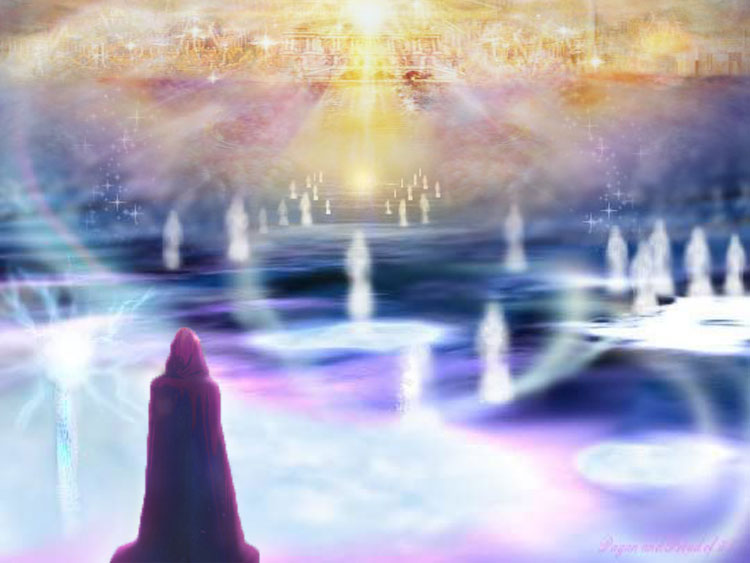Life Beyond The Veil
This volume (what follows is a short excerpt) contains the first of a series of communications from beyond the veil, received and written down by the Rev. G. Vale Owen, Vicar of Orford, Lancashire.
It should be clearly understood that these messages, while complete in themselves, deal chiefly with the “Sphere of Light” nearest to the earth in which the Vicar’s mother, who is the principal communicator, states that she dwells, and that her impressions are chiefly individual to herself and are thus those of a newcomer and learner whose experiences are limited to a restricted area. Wider regions and greater heights and depths are explored, the inter-relation of this and the after-life is more fully explained, and both narrative and exposition of aims and principles are more vigorous, clear and comprehensive in succeeding messages, contained in other volumes of the series which follow this. ~ H. W. Engholm
“We walked over the plain, and then went through the air, which requires more exertion, but is more speedy, and, in a case like ours, more convenient in enabling us to get a view of the country.
We sighted the City and descended before the principal gateway, by which we entered the main thoroughfare. It ran straight through the City and emerged through another gateway on the other side. On each side of this broad street there were large houses, or palaces, in spacious grounds, the residences of the principal officials of that district of which the City itself was the Capital.
As we came towards the City we had seen people working in the fields, and also many buildings, evidently not residences, but erected for some useful purpose. And now that we were within the City walls we saw the perfection of both buildings and horticulture. For each building had a typical garden to match it both in color and design. We passed on, waiting for some sign as to our destination and mission, for on such occasions as this, a message is always sent on ahead, so that the visitors are expected. When we had gone some way we entered a large square, where beautiful trees grew on lawns of the greenest of green grass, and fountains played a harmony together; that is to say, there were perhaps a dozen fountains, and each had a tone of its own, and each was composed of many smaller jets of water, each being a note. These are manipulated, on occasion, so that a fairly complicated piece of music can he played, with an effect such as that produced by an organ with many stops. At such times there are large numbers of people assembled in the square, or park, as I might call it, both of the citizens and also those who dwell outside among the hills and pastures. But when we came to it, the fountains were playing a simple series of chords, in perfect harmony, and with a most pleasing effect.
Here we lingered for awhile, for it is exceedingly restful and beautiful. We sat and lay upon the grass, and presently there came towards us a man who, by the smile on his face as he approached, we knew was the one who had been expecting us. We arose and stood before him in silence, for we did not feel inclined to begin the conversation, as we saw he was an angel of some degree considerably above us.
Please describe him, and give me his name if possible.
All in good time, dear. We learn to eliminate impatience here as a thing which confuses without adding impetus to the matter in hand.
He was tall—much taller than the average man on earth. I should say he would be some seven and a half feet high in earth measurement. I am considerably taller than I was when with you, and he was much taller than I am. He wore a cream-colored tunic, almost to his knees, bare arms and legs, and no sandals.—You see I am answering what you are questioning in your mind.—No, he had nothing on his head, but a beautiful veil of soft brown hair, parted in the middle and curling round his face and neck.
One broad fillet of gold he wore, and in the centre and at the sides were set three large blue stones. He wore a belt of silver and some pink metal intermingled, and his limbs shone with a soft glow. And these points, together with others, told us of his high degree.
There was also a calm benevolence and power in his firm but kindly countenance which gave both peace and trustfulness to us, as we stood before him, but also induced a reverence which we were glad to pay to one of such real worth as he.
He spoke at last, quietly, modulating his voice, as we instinctively knew, to our case. We could, nevertheless, detect the reverberating power in the tone of it. “I am Castrel,” he said. “You have already heard of me from your own Superior, and now we meet in person. Now, my sisters five, come with me, and I will tell you why you have been sent to this City and to me.” So we followed him, and on the way he chatted pleasantly, and we were quite at ease in his presence.
He led us down an avenue at right angles to the square, and then we emerged into another square; but we saw at once that this was a private square, and that the great palace, which lay away across the parklands before and around it, was the residence of some great Lord. We were guided through the park until we approached the great building, which stood, like some Greek temple, on a plateau which had a flight of steps on all sides of it.
The building was immense, and stretched before us, to right and left, and had high arches and entrances and porticoes, and surmounting it was a great dome. It was the landmark we had seen when approaching the City, only we found that it was not all gold, but gold and blue. We inquired who lived here, and he answered, “Oh, this is my home; that is, it is my city home; but I have also other houses out there in the country parts where I go from time to time to visit my friends whose duties lie in those districts. Come within and you shall be given the welcome which is your due, who have come so far to see us.”
He spoke quite simply. I have come to know that here simplicity is one of the marks of great power. One might have thought that the proper way to usher one into the presence of a great noble would be to send servants to lead us to the Palace, and then that he should receive us in state. But they look at things differently here. No purpose would have served in this case by such ceremony, and so it was dispensed with. In cases where ceremony is helpful or desirable it is observed and sometimes with much grandeur. When it has no use it is not observed.
So he led us within, and we found that the interior of the house was lofty and very magnificent. The entrance-hall in which we stood was circular in shape, and open right up to the great dome above, which did not stand over the centre of the building, but receded a little from the portico over this entrance. The rotunda was richly embellished with stones of many colors, and hangings of silk-like texture, mostly of deep crimson.
Doorways led off down long passages in front and on either side of us. Doves flitted about the dome itself, and evidently had means of ingress and egress. The material of which the arching roof of this dome was built was a kind of semi-opaque stone, and permitted the light to filter through in a softened glow. When we had looked about us for a time we found that we were alone, for Castrel had left us.
By and by, from down a passage on our right, we heard laughter and happy voices, and there presently emerged a party of women, with a few children among them. They numbered about twenty in all, and came to us, and took our hands in welcome, and kissed us on the cheek, and smiled on us, so that we were happier, if possible, than before. Then they drew away, and stood at a little distance, except one who had remained in the rear. She came forward and led us to a recess in the wall, where she bade us be seated.
Then, standing before us, she addressed each of us by name in greeting, and said, “You will wonder why you have come here, and what this City and place is to which you have been sent. This house in which you now are is the Palace of Castrel, as, no doubt, you already know. He is ruler of this wide district, where many occupations are followed, and many studies are pursued. I hear you have already been to the Colony of Music, and farther on to other settlements, where different branches of science are carried on. Now, we are in touch with all of these, and are constantly receiving their reports as to progress in this or that branch. These are considered and dealt with by Castrel and his officers, from the harmony point of view, as I will call it. Co-ordination, however, would express what I mean.
“For instance, a report will arrive from the College of Music, and another from that of Light, and another from the settlement where the Creative faculty is studied, and from other branches of service. These are all very carefully examined and analysed and tabulated, and, where necessity requires, the results are tested here, in one or other of the laboratories attached to this City. You will have seen some of these as you approached. They are scattered over the country to a great distance. They are not quite so complete in detail as those you have visited elsewhere, but, when any new apparatus is required, a mission is dispatched to inquire as to the construction, and these return and erect it in the spot most fitting in relation to the other establishments in this district; or perhaps it is added to the other apparatus already in existence in one or other of the buildings.
“You will understand, therefore, that an Overlord such as he who controls so varied a combination of knowledge must be well advanced in wisdom, and also is kept very busy at his work. It is this work you have been sent to see, and, while you remain with us, you will have ample opportunity of visiting some of the outlying stations. You will not, of course, understand all, or perhaps very much, of the scientific side of the work, but enough will be shown you to help you in your future work. Now come, and I will show you over this house, if you would care to see it.”
We replied that we would, and thanked her for her kindness. So we went all over the principal parts of that magnificent dwelling. That is the only word I can find for it. Everywhere was color blended with color, bold but harmonious, and in such a way that, instead of being glaring, it had sometimes an exhilarating and sometimes a soothing and restful effect. Jewels and precious metals and beautiful ornaments, vases and pedestals and pillars—some standing alone as an ornament, each by itself, some in groups—hangings of glittering material which, as we passed through some doorway, swung into place again with a musical murmur, fountains with fish, courtyards open to the sky, in which grass and most beautiful trees and flowering shrubs grew, of such colors as are not known on earth. Then we ascended to the roof, and here again was a roof garden, but one of large extent, with grass and arbors and shrubs and fountains once again.
In this mansion we stayed for a considerable period, and visited both the City and also the district around, a district which in earth measure would be reckoned in thousands of miles across, but all in constant touch with the City and its communicating stations, and with this central Palace itself. Time would fail to tell you all. So I will just give you a few details, and leave you to imagine the rest, which, however, I know you will fail to do.
We were walking down the principal street of that beautiful city on a tour of inspection. We wanted to understand why it was laid out in so many squares, and what was the use of some of the buildings we had noticed on both sides of that broad way. When we had arrived at the farther gateway, we saw that the City stood very high above the surrounding plains. Our guide explained that the reason for this was that those on the towers might see as far as possible, and also might be seen by those in the distant settlements of this district. This was the Capital City of the region, and all business going on found its focus here.
On our way back we visited several of the buildings, and were everywhere kindly received. We found few children, other than those in Castrel’s Horne. Here and there, however, there were groups in the squares, where the fountains played and were surrounded by basins into which their waters fell. These were all connected with one broad stream which issued forth from one side of the City, and fell into the plain below, a brilliant waterfall of many tints and of sparkling brightness. It took its way across the plain, a fairly broad stream flowing gently over the sands, and we saw, here and there, some children bathing in it, and throwing it over their beautiful bodies in great enjoyment. I did not think much of this until my guide remarked that these children were encouraged to bathe in the waters, as they were electrically charged, and gave strength to them, for many came here very weak and required such nourishment.
I expressed my surprise at this, and she replied, “But what would you have? You know that, although not of material flesh and blood, yet our bodies here are solid and real as those we have laid aside. And you know that these bodies of our present state correspond to the spirit within much more accurately than those others used to do. Now these little spirits are, most of them, only beginning to develop and need bodily nourishment to help them on the way. Why not?”
Why not, indeed! Surely I was slow to learn all that that phrase I have already given you implied, “Earth made perfect.” I fear many of you when you come over here will be much shocked to see how very natural all things are, even if more beautiful than on the earth. So many expect to find a vague shadowy world over here, totally diverse from earth in every possible way. And yet, come to think of it, and with common sense, what good would such a world be to us? It would not mean a gradual progress for us, but a vast leap, and that is not the way of Spirit.
Things here when first we arrive are certainly different from those of the old life, but not so different as to make us feel dumbfounded by their strangeness. Indeed, those who come over after living an unprogressive life on earth, find themselves in spheres of so gross a character as to be, to them, indistinguishable from earth itself. That is one of the reasons why they are not able to realize that they have changed their state. As you progress through the lower spheres into the higher, this grossness gradually gives place to more rare conditions, and the higher you go, the more sublimated is the environment. But few, if any, pass into those spheres where no trace of earth is seen, or no likeness to the earth life. I doubt if, as a rule, any do. But of this I must not speak dogmatically, for I have not myself reached, or even visited, a sphere where there is absolutely no likeness to beautiful earth. For it is beautiful, and we have to learn its beauties and wonders here, as part of our training. And, learning so, we find that earth is but one further manifestation outward from our own spheres, and in tune with us and our present environment in many very intimate ways. Were it not thus we could not be communing with you at this moment.
Also—and I merely say this as it appears to me who am not very wise in these things—I do not see how people passing over from the earth life into this could possibly get here were there a great gap between us, a gigantic void. How could they cross it? But that is simply my own thought, and there may be nothing in it at all. Only of this I am fairly certain: if people would but keep in mind the Oneness of God and His Kingdom, and the gradual progression which, in His (infinite) wisdom, is ordained for us, then they would much better understand what death is and what is beyond. It would probably be utterly absurd to many to be told that here we have real solid houses and streets and mountains and trees and animals and birds; and that animals are not here for ornament alone, but also for use; and that horses and oxen and other animals are put to use. But they enjoy their work in a way which makes one glad to watch them. I noticed a horse and rider coming along the street once, and I wondered which was enjoying the canter the more of the two. But I fear this will not be accepted by many, so I will get on to another theme.
One of the buildings in the broad street was a library where records were kept of reports from the outlying stations. Another was a laboratory where some of the reports could be tested by actual experiment. Another was a lecture hall where professors gave their results to those of their own and other branches of science.”
Excerpt from The Life Beyond The Veil
Posted in Life On The Other Side, Other Topicswith comments disabled.






